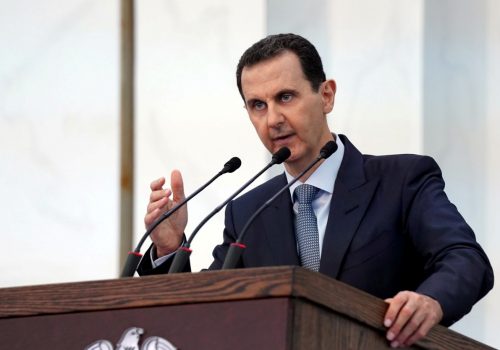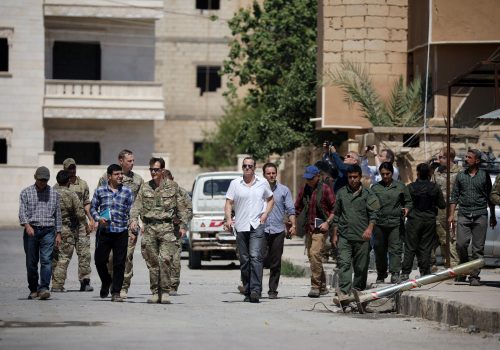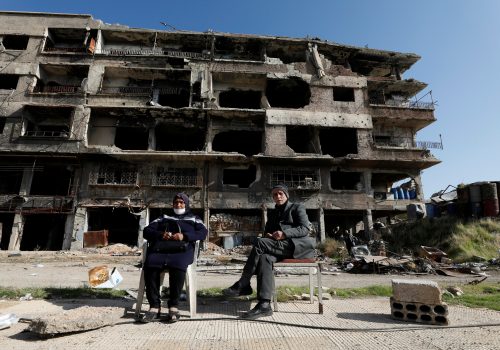FAST THINKING: Biden’s first bombing
JUST IN
Thirty-seven days. That’s how long it took before the Biden administration carried out its first known use of force abroad against a US foe. It came in the form of an airstrike against facilities in eastern Syria used by Iranian-backed Iraqi militant groups, in retaliation for rocket attacks in northern Iraq on February 15 that killed a contractor working with the US military and injured a US service member and other contractors. What does the strike signal about Joe Biden’s simultaneous efforts to re-engage Iran in talks to revive their nuclear deal? And what does it suggest about how the president will approach military action and the American presence in the Middle East?
TODAY’S EXPERT REACTION COURTESY OF
- Tom Warrick (@TomWarrickAC): Nonresident senior fellow and former Department of Homeland Security official
- Kirsten Fontenrose: Director of the Scowcroft Middle East Security Initiative and former US national-security official
- Barry Pavel (@BarryPavel): Director of the Scowcroft Center for Strategy and Security and former US national-security official
How we got here
- Tom sees a “familiar if disappointing pattern” in Iran’s behavior leading up to Biden’s strike. “Rather than simply accept the Biden administration’s offer” for the United States and Iran to jointly come back into compliance with the 2015 nuclear agreement, “Iranian leaders wanted to bargain for more. First they signaled they expected unilateral US concessions. When this failed, Iranian leaders tried to signal disinterest in a rapid return to their own compliance.” Then came this month’s attack by Iranian proxy forces on the American presence in Iraqi Kurdistan.
- Iran’s strategic goals here are clear, he adds: “The lifting of almost all economic sanctions against it, the ability to sell its oil for a maximum price, and no constraints on its proxy campaigns in Iraq, Syria, Lebanon, or Yemen, which are part of a strategy to drive the United States from the Gulf, starting with Iraq.”
The bottom line for nuclear negotiations
- That February 15 attack in northern Iraq contained a lesson for the Biden administration, Kirsten argues: “Extending an olive branch to the regime in Tehran does not impact Iran’s objective of pushing the United States from the region, nor alter their methods for pursuing it.”
- And Biden’s first strike, which was similar to strikes by the Trump administration in response to attacks by Iranian-linked militias in Iraq, is unlikely to prevent these provocations even as diplomatic efforts to reach a nuclear accord proceed. “Targeted airstrikes remove enemy capabilities from the battlefield in Iraq and Syria, but they do not curtail attacks on US forces or allies,” Kirsten tells us. “The attacks on US forces in Iraq and US allies in the Gulf will continue regardless of nuclear negotiations, and the United States will continue to be pressed to respond.”
- But there’s a variable that could change these dynamics, she adds: “The one possible differentiator could be the improved US-Europe relationship, if it leads to unified pressure on Iran to stop directing attacks or risk the continuation of sanctions.”
A close read of the strike itself
- The specifics of what Biden chose to do in Syria matter, Barry advises. The military action appears to have been “carefully calibrated” in terms of both the target and the messaging, intended to “de-escalate the situation” after the rocket attacks in Iraq “while also making clear to the Iranians that the United States will respond to such aggression at a time and place of its choosing.”
- As far as “the ongoing diplomatic dance between the Biden administration and the Iranians” on the nuclear deal, he notes, the strike came with an additional message for Tehran: “The United States will not be pushed around.”
- Keep in mind the global context as well, Barry adds. Biden is signaling that we “won’t be seeing perceived disproportionate strikes against the most senior Iranian officials such as the Trump administration strike on Qasem Soleimani in January 2020. The Biden administration does not want to get dragged into a war in the Middle East” and has higher military priorities elsewhere in the world: “The alarm bells regarding potential Chinese military aggression against Taiwan are ringing loudly.”
Further reading
Mon, Feb 1, 2021
Syria: Which way forward under Biden?
MENASource By Frederic C. Hof
The default position of President Joe Biden and his team will likely be along the lines of trying to manage the mess.
Wed, Jan 20, 2021
Fragmentation and perceived bias: The shortcomings of US policy towards tribes in Syria
MENASource By
The fragmentation and divisions that plague the Arab tribal population in northeastern Syria played a major role in the US’s decision not to rely primarily on tribal auxiliaries in its fight against ISIS.
Thu, Dec 3, 2020
Limited and constrained: The Biden administration and the prospects of a Syria policy
MENASource By Abdulrahman al-Masri
While any departure from the Trump administration’s transactional and inconsistent leadership is welcomed, the hopes surrounding the incoming Biden administration’s return to engagement in Syria requires more in-depth scrutiny.
Image: An aerial view of the Pentagon building in Washington, June 15, 2005. via REUTERS


